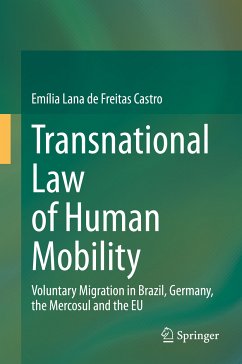
Practice of Transnational Law (eBook, PDF)

PAYBACK Punkte
65 °P sammeln!
It has been clear for some time that commercial law has been undergoing a "transnationalization" process, with various sets of rules (often referred to collectively asLex Mematoria or the New Law Merchant) supplanting national and local laws governing the mechanisms by which cross-border agreements are entered into and disputes settled. In order to clarify the nature and extent of this process, a scientific survey, sponsored by the Volkswagen Foundation and using empirical methodology, was designed by a Research Team from the Center for Transnational Law (CENTRAL) of Münster University, Germa...
It has been clear for some time that commercial law has been undergoing a "transnationalization" process, with various sets of rules (often referred to collectively as
Lex Mematoria
or the New Law Merchant) supplanting national and local laws governing the mechanisms by which cross-border agreements are entered into and disputes settled. In order to clarify the nature and extent of this process, a scientific survey, sponsored by the Volkswagen Foundation and using empirical methodology, was designed by a Research Team from the Center for Transnational Law (CENTRAL) of Münster University, Germany. A questionnaire was sent out to more than 2,700 practitioners from major companies and international law firms in 78 countries asking for the addressees'' experience with transnational law in international contract negotiations, contract drafting and international commercial arbitration. The results of this unique enquiry, along with analysis and commentary from several well-known authorities in the fields of international commercial arbitration and private international law, were presented at a conference in Münster on May 4 and 5, 2000. This book is a record of that conference.
The Practice of Transnational Law provides, for the first time, a comprehensive and realistic evaluation of how transnational commercial law is used in international legal practice today. The contributions of the speakers - including Yves Derains on the ICC Arbitration Rules and Michael Joachim Bone11 on the UNIDROIT Principles, as well as commentary by Emmanuel Gaillard, Friedrich K. Juenger, Norbert Horn and Klaus Peter Berger - and a summary of the discussions add an insightful and lively dimension to the empirical data presented in the annexes. Commercial law practitioners and business people all over the world will appreciate the new level of discussion initiated by this important book.
Lex Mematoria
or the New Law Merchant) supplanting national and local laws governing the mechanisms by which cross-border agreements are entered into and disputes settled. In order to clarify the nature and extent of this process, a scientific survey, sponsored by the Volkswagen Foundation and using empirical methodology, was designed by a Research Team from the Center for Transnational Law (CENTRAL) of Münster University, Germany. A questionnaire was sent out to more than 2,700 practitioners from major companies and international law firms in 78 countries asking for the addressees'' experience with transnational law in international contract negotiations, contract drafting and international commercial arbitration. The results of this unique enquiry, along with analysis and commentary from several well-known authorities in the fields of international commercial arbitration and private international law, were presented at a conference in Münster on May 4 and 5, 2000. This book is a record of that conference.
The Practice of Transnational Law provides, for the first time, a comprehensive and realistic evaluation of how transnational commercial law is used in international legal practice today. The contributions of the speakers - including Yves Derains on the ICC Arbitration Rules and Michael Joachim Bone11 on the UNIDROIT Principles, as well as commentary by Emmanuel Gaillard, Friedrich K. Juenger, Norbert Horn and Klaus Peter Berger - and a summary of the discussions add an insightful and lively dimension to the empirical data presented in the annexes. Commercial law practitioners and business people all over the world will appreciate the new level of discussion initiated by this important book.
Dieser Download kann aus rechtlichen Gründen nur mit Rechnungsadresse in A, B, BG, CY, CZ, D, DK, EW, E, FIN, F, GR, HR, H, IRL, I, LT, L, LR, M, NL, PL, P, R, S, SLO, SK ausgeliefert werden.













